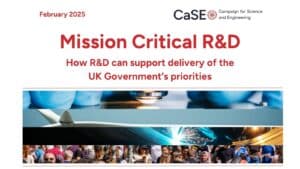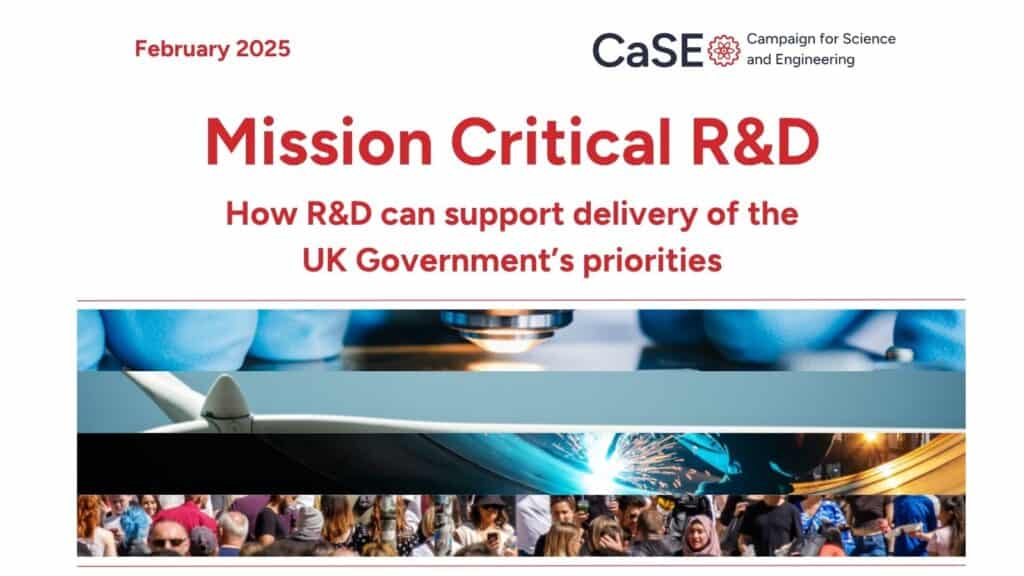What do the public think about R&D and the UK Government’s missions?
27 Feb 2025
Florence Young
Public Opinion and Policy Officer
In the run up to the UK Government’s 2025 spending review, CaSE conducted research into public attitudes towards R&D and the Government’s missions.
The election of a new UK Government and the setting of a new legislative agenda present a clear, and rare, opportunity for the R&D sector to make its case afresh.
As part of CaSE’s work exploring the role of research and development (R&D) in delivering the UK Government’s priorities, we carried out public opinion research in September and December 2024 to explore attitudes towards the UK Government’s five national ‘missions’ and perceptions towards R&D as a tool to achieve these missions.
The five missions, as set out at the time of polling, were to:
- Kickstart economic growth
- Build an NHS fit for the future
- Take back our streets [by halving serious violent crime]
- Break down barriers to opportunity [by reforming childcare and education systems]
- Make Britain a clean energy superpower
The UK Government’s recently published Plan for Change sets out milestones for how it will deliver on these missions and it has stated that economic growth is its central mission.

Mission Critical R&D
How R&D can support delivery of the UK Government’s priorities
Read the full reportExplore CaSE Public Attitudes to R&D and the Government's Missions 2024
Explore the findingsAn important, but unclear, role for R&D
Many see R&D as having an important or essential role to play across all the mission-based objectives, and a majority think that the Government should use R&D as a tool to achieve its missions (72%). Despite this, more than a third (37%) of all respondents thought it was unclear how R&D would help the Government achieve its missions.
While R&D is considered a useful part of the strategy to achieve the missions, it isn’t the most obvious approach for most people. There is a clear opportunity for the R&D sector to strengthen this connection between R&D and the UK Government’s priorities in people’s minds and, in doing so, broaden support for R&D and R&D funding among the UK voter base.
Shifting public priorities
The public are most concerned with the cost of living and quality of the NHS, with the cost of living being viewed as the most important issue facing the UK since 2022.
However, compared to previous polls, concerns about levels of immigration and crime have both risen, with immigration now close behind the state of the economy, and levels of crime selected by 18%, slightly overtaking concern for the threat of climate change (17%).
Crime levels
This increasing public concern about crime levels was reflected in our focus groups, with participants seeing the crime-reduction mission as a top priority.
Yet, this same mission was seen as the least achievable in our polling. A majority (57%) felt that the Government will either make only a small amount or no progress towards achieving its crime-reduction mission in the next 5 years.
Interestingly, our research found that, when considering the crime-reduction mission, including an R&D approach of “investing in Research & Development of new security technology” led to a slight increase in the proportion of people saying the plan was forward-thinking and more likely to be fully achieved by the Government.
With crime becoming an increasing public priority, this mission could present an opportunity for the R&D sector to clearly demonstrate a role for R&D in delivering on issues that matter to people.
Clean energy
The mission to “Make Britain a clean energy superpower” and its objectives were consistently put as a low or lowest priority in both polling and by participants in focus groups. This included when poll respondents were asked to pick which one mission would benefit the most from R&D.
Yet we also found that a majority see an important or essential role for R&D in the clean energy mission objectives. Similarly, R&D relating to clean energy was at the forefront in focus groups when participants were asked to give examples of R&D that would benefit any mission.
Previous CaSE research has shown that 42% think new research is essential for tackling climate change, and that 75% think that investing in an R&D solution is a better way to address climate change than a non-R&D solution.
Together these findings suggest that, although in isolation the public see an important role for R&D in climate and clean energy goals, when forced to choose, people aren’t prioritising the clean energy mission itself or its mission-related objectives. It is possible that this lack of prioritisation of the UK Government’s clean energy goals, in the face of other pressing issues, is also colouring people’s answers as to which mission would benefit most from R&D.
Informing CaSE’s wider work
The findings from this focused poll formed an integral part of our recent policy roundtables with R&D stakeholders on the role of R&D in the missions, stimulating discussions on the value that R&D can bring and how to best communicate this contribution.
These insights, alongside our wider public opinion research, informed our latest policy report on this subject, including recommendations on how the sector can better articulate the value of R&D to the missions to both policy makers and the public.
The full results of our latest quantitative and qualitative research also include a section exploring the attitudes of a cohort of voters that the UK Government is expected to focus on attracting or maintaining to win the next election. These ‘target voters’ are anticipated to play an influential role in the UK Government’s political thinking and communication over the coming years. CaSE’s public opinion research will continue to track their views and the impact they may have on policymakers and politicians of all stripes.
Related resources

This briefing summarises attitudes to the UK Government’s missions from CaSE’s September 2024 public attitudes study.

This report sets out evidence on the integral role of R&D in driving progress on the UK Government’s missions.

The R&D sector has a public image problem. Research Develop Thrive is here to change that – This post originally appeared in the Association of Research Managers and Administrators (ARMA) insights magazine on 12th December 2024.

When public finances are tight, advocates need to give a compelling justification for R&D being a national priority – This post originally appeared in the Association of Research Managers and Administrators (ARMA) insights magazine on 28th November 2024.